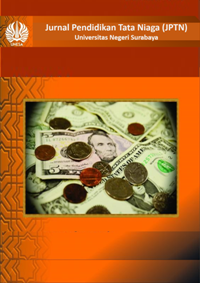PENGARUH PEMBELAJARAN KEWIRAUSAHAAN TERHADAP NIAT BERWIRAUSAHA SISWA KELAS 11 BISNIS DIGITAL SMKN 1 SOOKO
DOI:
https://doi.org/10.26740/jptn.v13n1.p72-79Keywords:
Entrepreneurial Education, Bussiness, Entrepreneurial Intentions, E-module, Marketing Basics, Student Response, Sigil Software, entrepreneurAbstract
Entrepreneurial intention is the beginning of the creation of entrepreneurial activities, and in the process of creating entrepreneurial activities, external assistance is needed to support the creation of a business. This assistance can be in the form of entrepreneurial learning. This study aims to analyze the effect of entrepreneurial learning on the entrepreneurial intention of grade 11 digital business students of SMKN 1 Sooko. This study uses a quantitative method. The location of the study was at SMKN 1 Sooko, with grade 11 digital business students as the research population. Samples were taken from grade 11 students majoring in digital business 1 and 2. The research instrument used was a questionnaire with data analysis techniques using SPSS version 25. The results showed that entrepreneurial learning influenced the entrepreneurial intention of grade 11 digital business students.
Downloads
References
Duong, C. D., & Le, T. L. (2022). ADHD symptoms and entrepreneurial intention among Vietnamese college students: an empirical study. Journal of Entrepreneurship in Emerging Economies, 14(3), 495–522. https://doi.org/10.1108/JEEE-02-2021-0049
Duong, D. (2022). Exploring the link between entrepreneurship education and entrepreneurial intentions: the moderating role of educational fields. Education and Training, ahead-of-p. https://doi.org/10.1108/ET-05-2021-0173
Fatonnah, C. D., Djuwita, D., & Busthomi, A. O. (2022). Pengaruh Pendidikan Kewirausahaan Dan Literasi Digital Terhadap Minat Berwirausaha Pada Mahasiswa Ekonomi Syari’ah IAIN Syekh Nurjati Cirebon. Hawalah: Kajian Ilmu Ekonomi Syariah, 1(2), 50–60. https://doi.org/10.57096/hawalah.v1i2.7
Gurel, E., Madanoglu, M., & Altinay, L. (2021). Gender, Risk-taking and Entrepreneurial Intentions: Assessing the Impact of Higher Education Longitudinally. Education + Training, ahead-of-p. https://doi.org/10.1108/ET-08-2019-0190
Hahn, D., Minola, T., Van Gils, A., & Huybrechts, J. (2017). Entrepreneurial education and learning at universities: exploring multilevel contingencies. Entrepreneurship and Regional Development, 29(9–10), 945–974. https://doi.org/10.1080/08985626.2017.1376542
Indarwati, Y. R. (2024). Entrepreneurial Intentions of Students Using the Shapero Entrepreneurial Event Model. 07(03), 511–521.
Khamimah, W. (2021). Peran Kewirausahaan Dalam Memajukan Perekonomian Indonesia. Jurnal Disrupsi Bisnis, 4(3), 2017. https://doi.org/10.32493/drb.v4i3.9676
Kirkley, W. W. (2017). Cultivating entrepreneurial behaviour : entrepreneurship education in secondary schools. 11(1), 17–37. https://doi.org/10.1108/APJIE-04-2017-018
Kusumojanto, D. D., Wibowo, A., Kustiandi, J., & Narmaditya, B. S. (2021). Do entrepreneurship education and environment promote students’ entrepreneurial intention? the role of entrepreneurial attitude. Cogent Education, 8(1), 1948660. https://doi.org/10.1080/2331186X.2021.1948660
Kuswanto, K., Suratno, S., & Asmarani, A. (2022). Pengaruh Manajemen Keuangan dan Pembelajaran Kewirausahaan Terhadap Intensi Wirausaha Mahasiswa Universitas Jambi. Jurnal Bisnis Dan Kewirausahaan, 18(3), 248–256. https://doi.org/10.31940/jbk.v18i3.248-256
Le, T. T., Nguyen, T. H., & Ha, S. T. (2023). The effect of entrepreneurial education on entrepreneurial intention among master students : prior self-employment experience as a moderator. Central European Management Journal, 31(1), 30–47. https://doi.org/10.1108/CEMJ-10-2021-0116
Nabi, G., LiñáN, F., Fayolle, A., Krueger, N., & Walmsley, A. (2017). The impact of entrepreneurship education in higher education: A systematic review and research agenda. Academy of Management Learning and Education, 16(2), 277–299. https://doi.org/10.5465/amle.2015.0026
Pittaway, L. A., Gazzard, J., Shore, A., & Williamson, T. (2015). Student clubs: experiences in entrepreneurial learning. Entrepreneurship and Regional Development, 27(3–4), 127–153. https://doi.org/10.1080/08985626.2015.1014865
Sari, A. I. C., Karlina, E., & Rasam, F. (2021). Peran Pendidikan Kewirausahaan Dan Motivasi Berwirausaha Dalam Menumbuhkan Sikap Mental Kewirausahaan Peserta Didik. Research and Development Journal of Education, 7(2), 403. https://doi.org/10.30998/rdje.v7i2.10287
Shapero, A., & Sokol, L. (1982). The Social Dimensions of Entrepreneurship. The Social Dimensions of Entrepreneurship, 72–90. https://ssrn.com/abstract=1497759
Shofani, A., Ridha, Kharnolis, M., Marniati, & Mayasari, P. (2023). Faktor Minat Berwirausaha Siswa Kelas XI Tata Busana terhadap Hasil Belajar Produk Kreatif dan Kewirausahaan di SMKN 1 Sooko Mojokerto. Jurnal Review Pendidikan Dan Pengajaran, 6(4), 2711–2719.
Sugiyono, P. D. (2017). Metode penelitian bisnis: pendekatan kuantitatif, kualitatif, kombinasi, dan R&D. Penerbit CV. Alfabeta: Bandung, 225(87), 48–61.
Utama, D. H., Mulyadi, H., Imbragia, S. T., & Disman, D. (2020). Pengaruh pembelajaran kewirausahaan dan motivasi wirausaha terhadap niat berwirausaha. Journal of Business Management Education |, 5(2), 16–21. www.kemenperin.go.id,
Zhang, Y., Duysters, G., & Cloodt, M. (2014). The role of entrepreneurship education as a predictor of university students’ entrepreneurial intention. International Entrepreneurship and Management Journal, 10(3), 623–641. https://doi.org/10.1007/s11365-012-0246-z
Downloads
Published
How to Cite
Issue
Section
License
Copyright (c) 2025 Yunda sekar Wilujeng, Novi Marlena

This work is licensed under a Creative Commons Attribution-NonCommercial 4.0 International License.
Authors who publish with this journal agree to the following terms:
- Authors retain copyright and grant the journal right of first publication with the work simultaneously licensed under a Creative Commons Attribution License that allows others to share the work with an acknowledgement of the work's authorship and initial publication in this journal.
- Authors are able to enter into separate, additional contractual arrangements for the non-exclusive distribution of the journal's published version of the work (e.g., post it to an institutional repository or publish it in a book), with an acknowledgement of its initial publication in this journal.
- Authors are permitted and encouraged to post their work online (e.g., in institutional repositories or on their website) prior to and during the submission process, as it can lead to productive exchanges, as well as earlier and greater citation of published work (See The Effect of Open Access).
Jurnal Pendidikan Tata Niaga (JPTN) is licensed under a Creative Commons Attribution-NonCommercial 4.0 International License.
 Abstract views: 100
,
Abstract views: 100
, PDF Downloads: 90
PDF Downloads: 90



